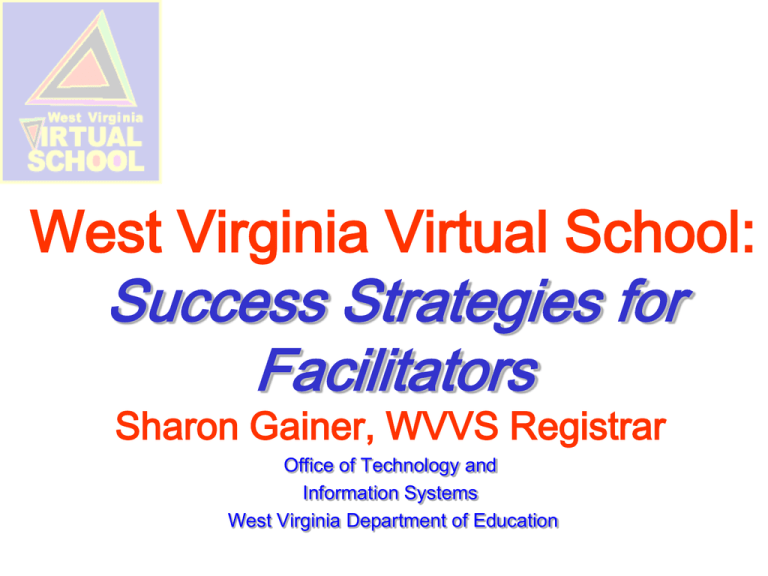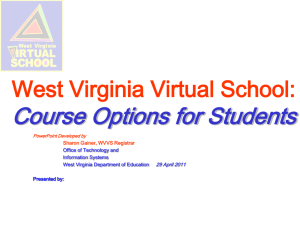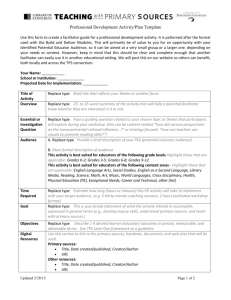FacilitatorsWVVSPresentation
advertisement

West Virginia Virtual School: Success Strategies for Facilitators Sharon Gainer, WVVS Registrar Office of Technology and Information Systems West Virginia Department of Education The Facilitator is the physical representative of the teacher in the distancelearning classroom. Why Distance Learning Courses? A significant share of West Virginia’s students live in rural areas, and attend small schools. WV has a decreasing population base, and this has resulted in public school staff cuts. WVVS was created “to offer high quality educational courses via Internet technology to all students.” In this setting, technological solutions are a key to assuring equitable access to education. WVVS Model WV does not currently have the resources to create and deliver web-based courses (the current exception to this is Spanish). WVVS delivery model involves: identifying providers that offer both high-quality courses and course delivery options. identifying quality courses that align with corresponding state content standards. WVVS model requires that the course provider make available an online teacher to direct and guide the student through the learning process. Content + Electronic Delivery + Online Teacher = Tuition Model currently used by WVVS Role of WVVS WVVS operates as a broker for state’s public schools and facilitates operational areas of delivery. WVVS evaluates and selects providers. WVVS evaluates and approves courses. WVDE negotiates statewide prices for services. WVVS currently provides 100% of tuition through a grant funded by the WV Legislature and awarded through a joint partnership of the WV Educational Broadcasting Authority and the WV Department of Education.* Tuitions can be funded until the funds have been expended.* What you need to know… All courses meet WV State Curriculum Goals and Objectives Counselors insure that courses fit students’ educational programs Some courses are electives—must be approved by county AP courses come from course provider, not WVVS (College Board Requirements) Student must be in WVEIS Local VS Policy School/County Virtual School Policy may provide guidelines for Which student may enroll Proctoring exams Drop policy Conditions for parent payment Role of facilitator The Facilitator is the key to success. Congratulations… You are the facilitator because… you are the virtual school contact you are the content specialist you are the technologist you run the lab you are the guidance counselor you hold the short straw What is your plan to ensure that the students succeed in the virtual environment? WVVS Training Options: WVVS Web Site On-Line Tutorial for Virtual School Contacts On-Line Tutorial for Facilitators Course Provider Web Sites Tech Coordinator at XXHS School level virtual school contact WVVS registrar Seat Time vs. Content Virtual course time constraints depend on course provider Completion of course depends on content There are no incomplete assignments There are no grades without a transcript Books and Materials Under WV school law, school/county must provide books and materials Check course provider’s list—many use digital books Time is of the essence Time is of the essence Choosing End Date Virtual class completion could match your semester, block, trimester schedule Student can complete on his own timeframe—faster/slower Student can work into the summer Vendor may set end date Monitor Progress Weekly meeting with student On-line monitoring Reports from course provider Student “show me” progress Chart progress of all students Schedule Disruptions No snow days No holidays (exception per vendor) No shortened schedule days No excused absences Rare extensions Dropping a Course What is the School VS Policy for dropping? What is the vendor’s policy for drops without cost? Did you notify the registrar by email? Did you notify your school counselor and VS contact? How Grades are Reported Class is entered in WVEIS as virtual course AP course grades are reported as given under Policy 2515 All other courses—numeric grade given by instructor Only transcripted grades can be recorded Course Providers and Effective Mentoring and Monitoring of Students WVVS Course Providers AMDG, Inc. BYU APEX Learning Aventa Learning Florida Virtual School Mountaineer Virtual Virtual Greenbush West Virginia Virtual School General Recommendations for Mentoring and Monitoring Familiarize yourself with provider. Require that students periodically meet with you to discuss progress and identify any barriers to participation. Verify student progress via providerrecommended procedures. Stay involved! Schools cannot abdicate responsibility for students. http://virtualschool.k12.wv.us The Facilitator is a good communicator. Communicates with the student: Dates and events Encouragement Management skills Study skills Computer skills Communicates with the WVVS Registrar: Problems and Questions technology learning partners obstacles to learning Successes student teacher/learning partner technology special processes developments in technology Communicates with the principal: Student progress Course progress and process Questions from the teacher Problems with technology or services Successes Communicates with parent: Course process and progress Student behavior and/or other concerns Successes and accomplishments Parent/Teacher Conferences Tips for Successful Facilitation Good Practice is Good Practice Select Students with Care Set Expectations for Students and Parents Conference with Students to Monitor Progress Check Reports Weekly Report Grades Bring Issues to Registrar in Timely Manner And now… What are your questions? What are your concerns? What are your comments? Contact Information: Sharon Gainer, Registrar, West Virginia Virtual School sgainer@access.k12.wv.us toll-free at 866-593-8065 Anne Meadows, Asst. Director, WVDE Office of Technology ameadows@access.k12.wv.us 304.957.9833 Ext. 53433 The Facilitator in the Distance Learning Classroom *A partnership for learning*

